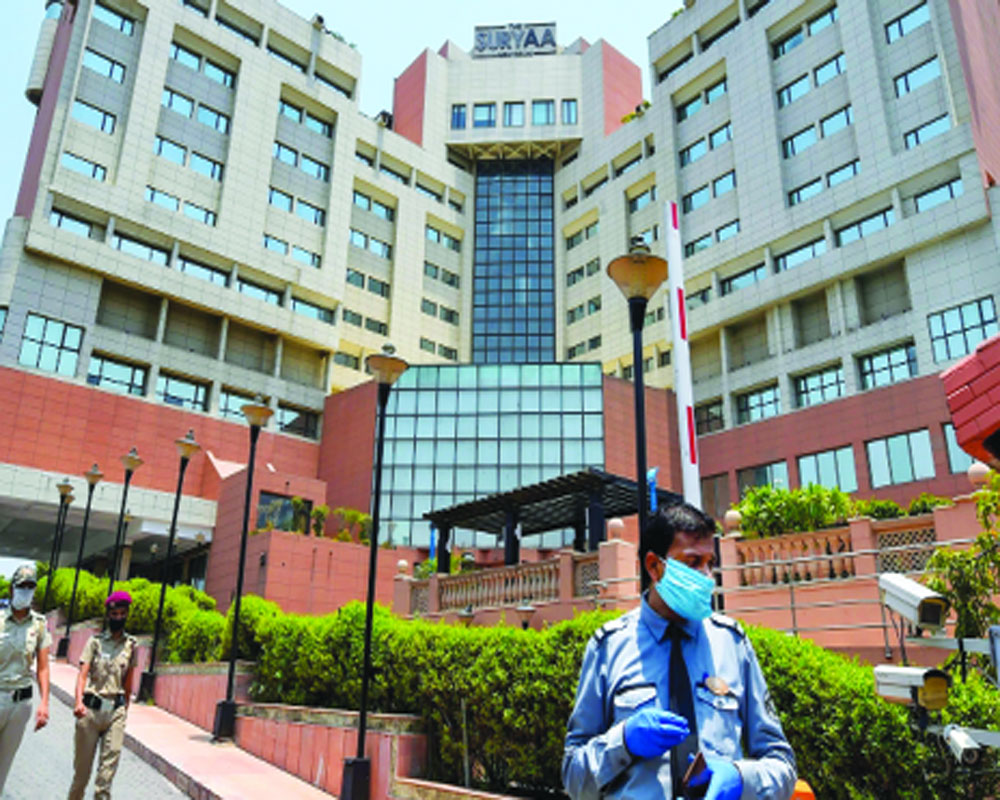City five-stars that have been converted to makeshift COVID-19 care centres fear stigma will hit future business. But we need them
Should Delhi, besieged as it is with the ever increasing numbers of Coronavirus patients and is running short of hospitals and beds to treat or resuscitate them, not requisition every public and institutional space to ramp up capacity? Only city hotels do not agree though the Government has attached the city’s five-star properties to nearby hospitals and act like their extension counter in times of the pandemic. So Hotel Crown Plaza in Okhla has been linked with the Batra Hospital and Research Centre, Hotel Surya in New Friends Colony with the Indraprastha Apollo hospital, Hotel Siddharth in Rajendra Place with Dr BL Kapur Memorial Hospital, Hotel Jivitesh in Pusa Road with the Sir Ganga Ram City Hospital and Hotel Sheraton in Saket with Max Smart Super Speciality Hospital. In fact, after appeals by the Federation of Hotel & Restaurant Association of India, a committee of Confederation of Indian Industries (CII) has written to the Delhi Government to revoke the order asking hotels to be converted to makeshift hospitals. Many industry representatives claim that hotels are neither designed nor equipped to deal with cases of this nature where ailing patients would need careful supervision in a sanitised environment. For example, the rooms do not have direct exhaust capacity, something that a specially designed and pooled facility would have. They argue that these plush properties are carpeted and, therefore, could not be sanitised as frequently as per protocol and could actually increase the risk of the disease spread. Besides, the staff are not experienced or trained in new SOPs and not necessarily want to deal with the pandemic in a frontline capacity. But what is actually worrying hoteliers is the social stigma attached to COVID-19 and its cascading effect on future bookings when the hotels do resume normal operations. No matter what the degree of sanitisation, disinfection and assurance of standards, hotels are worried that guests would not still want to check into what was once a COVID-19 facility simply because there would be an erosion of safety and confidence. And hotels rely on brand value and a carefully curated image of service for traction. It doesn’t matter if providing service and succour to the pandemic-hit is noble and conscientious; it just won’t up bookings or its ratings. The hospitality industry, which is estimated to be incurring a loss of almost Rs 5 lakh crore and job losses of around three crore, has already stepped up by offering quarantine facilities, hosting doctors and healthcare workers and providing food and basic services. But given the swamp in Delhi and the pressure on existing hospitals to provide care and a bed to the sick, there seems to be no other option but to make use of every bit of covered public space. Saving lives is more important and desperate times do call for desperate measures. Besides, although recent MHA guidelines have allowed hotels to go for a graded opening, most of them cannot operate given their geographical proximity to virus clusters. Also, these will be used for non-critical patients and those requiring basic oxygen support. Serious patients will anyway be moved to the adjoining hospital facility. So at least there will be a steady revenue stream in a bad year. With or without being a COVID facility, not many guests will anyway be knocking at the door. Repurposing may actually help some properties yet.
The Delhi Government has not done anything exceptional but followed templates of social responsibility. World over, nations have adopted a similar move to tackle a surge in the number of cases. While some turned into shelters for Coronavirus patients with mild symptoms, others converted them to safe houses to isolate those who may have been in contact with confirmed cases. For example, a four-star hotel in Madrid was transformed into a medical care facility to treat people with mild symptoms. Hoteliers voluntarily allowed regional authorities to use 40 hotels with 9,000 beds to treat patients. In the US, hotels in Chicago, big and small, were the first to clinch a deal with the Government as they started housing frontline medical workers and military personnel. Spaces were also provided to infected patients and those awaiting test results for quarantine. In Europe, the largest hospitality company, Accor, too, opened 40 of its branch hotels in France to provide shelter to those at the frontline, the nursing staff, doctors and the sick. In the end, no service is coming for free and if in the process, we can save lives and stem fatalities in unprecedented times, that testimomial, too, would hold good for posterity.


























